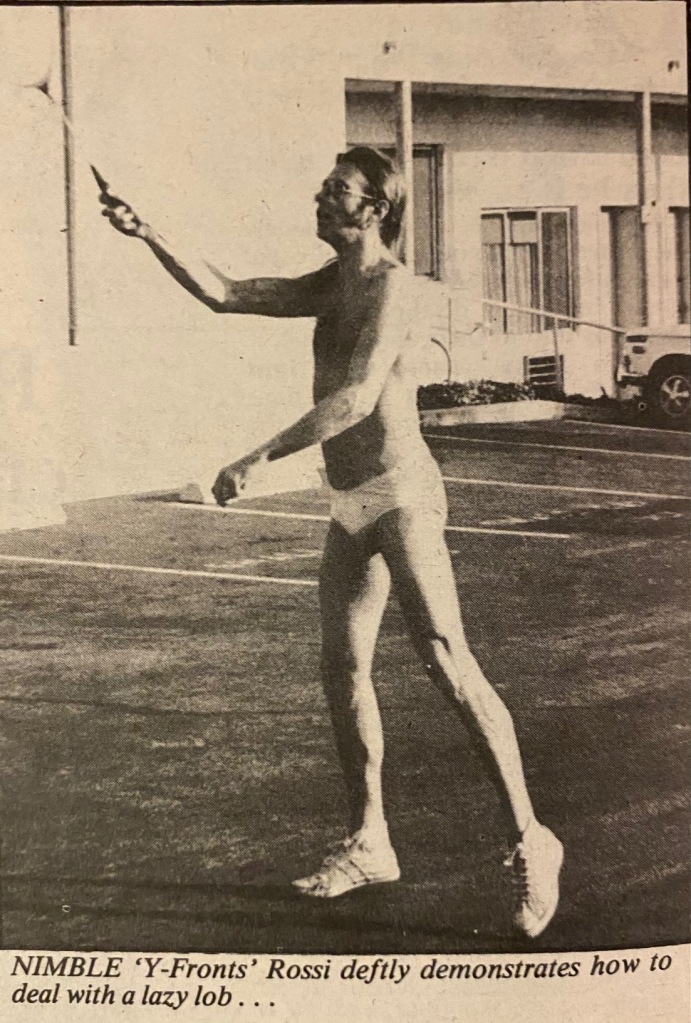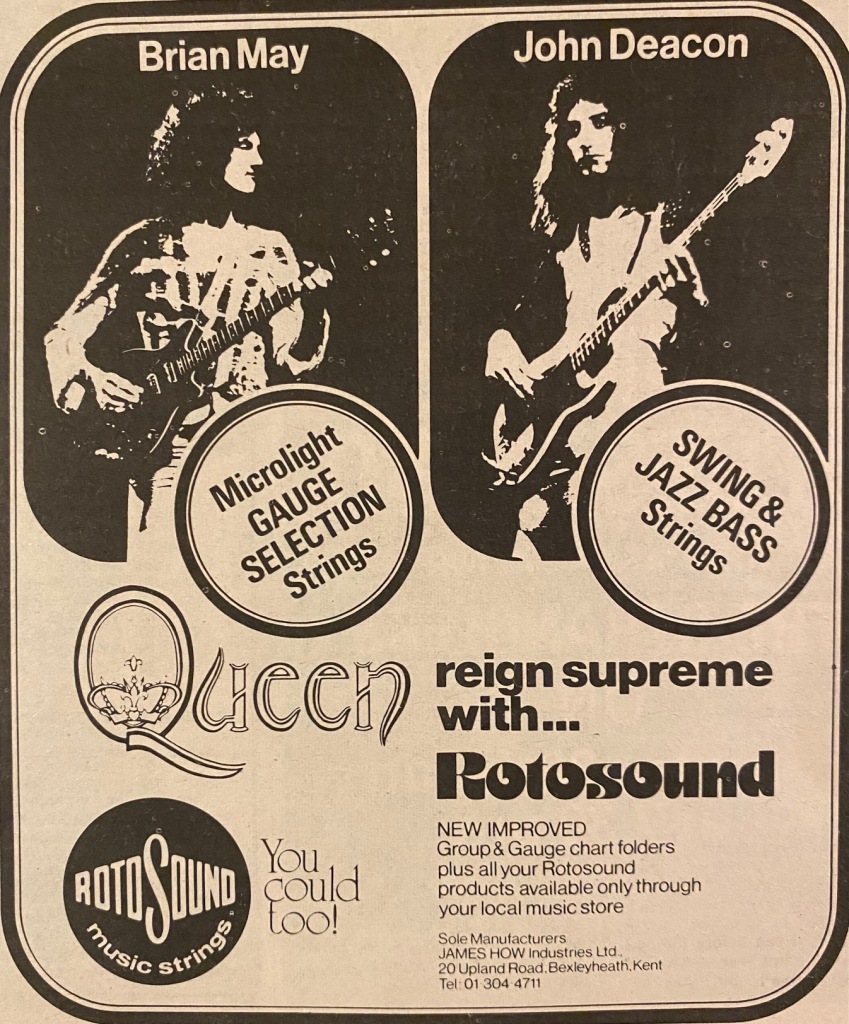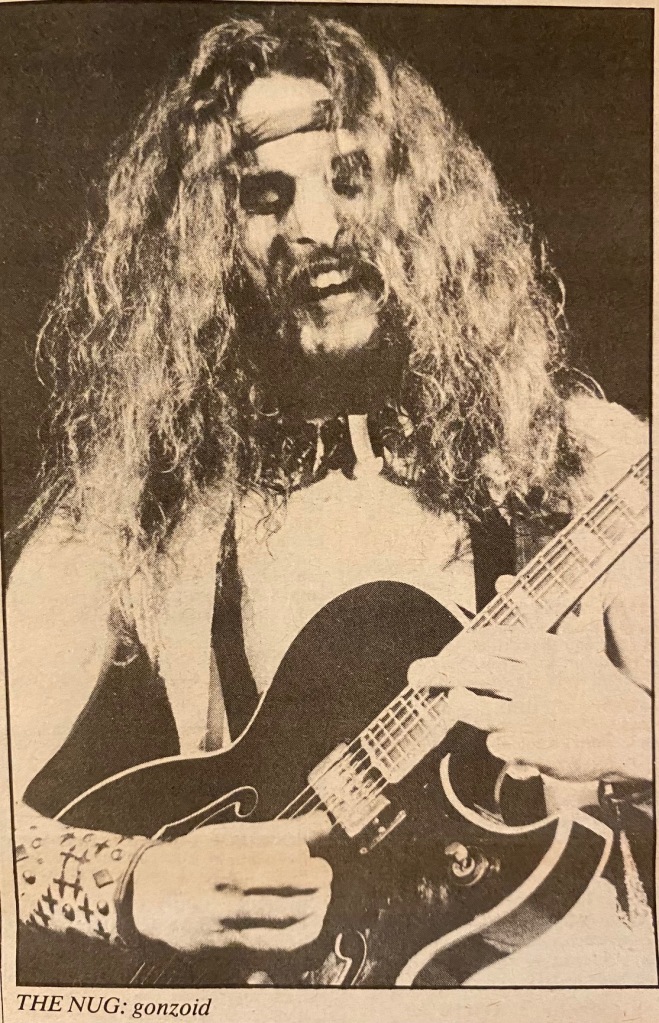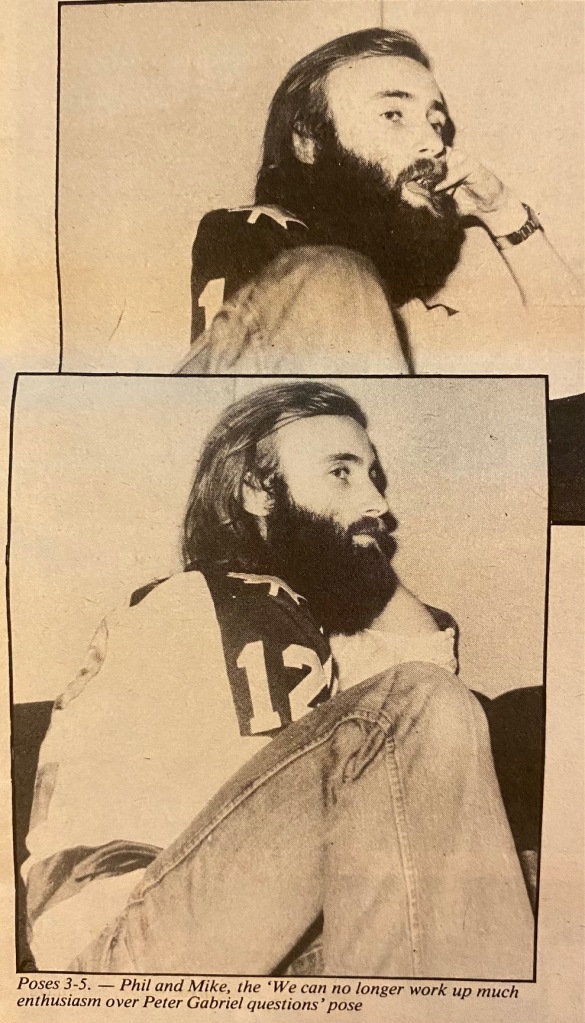Even though this band is one of the biggest in English music history, they have always been seen as “down to earth” and very much regular people that the people in the crowd could identify with. I think that fact has contributed to their success, and not only their huge amount of single hits. Loveable lads dressed like their fans – that`s Status Quo.
Read on!
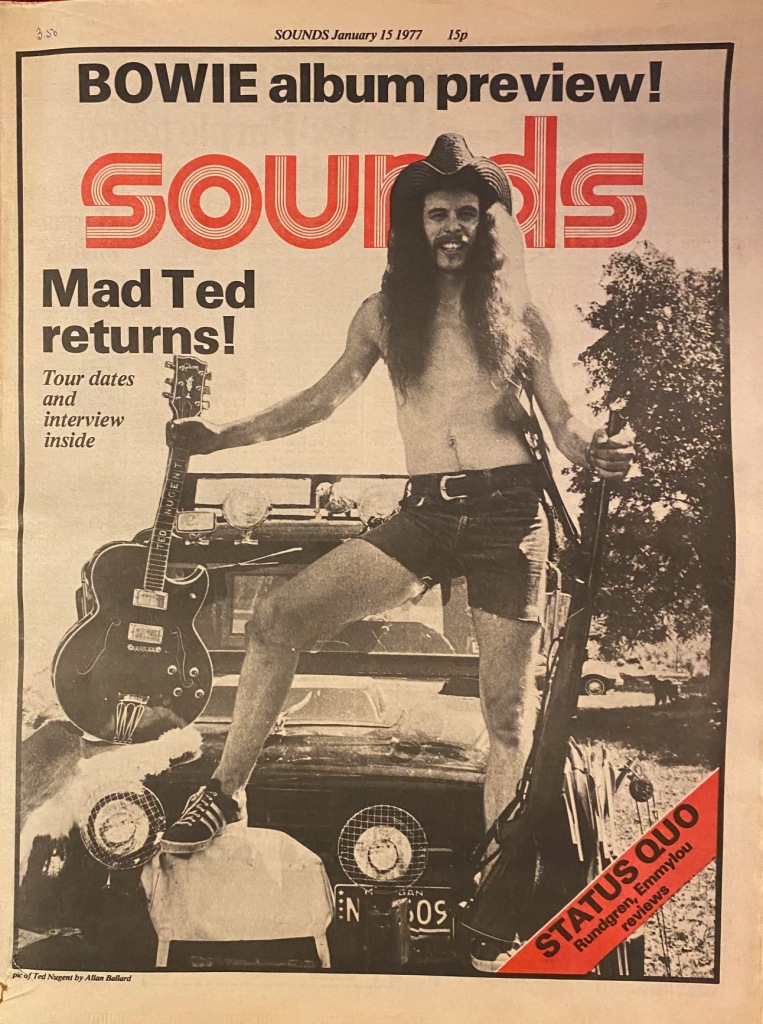
Blue is the colour
And boogie is the game for Francis Rossi and the denim clad masters of the three-chord trick
By John Shearlaw
RELAX. Status Quo have finally (gasp) made it to the top of the tree. According to one daily newspaper they have just copped the ultimate accolade in the world’s hardest working profession. Of course I mean the music business, and ten years on it might just become acceptable to like them. The world can breathe again.
How are they going to act now? You see they’ve just been rehearsing living up to their new moniker for this week; Status Quo, the band voted by the astute readers of the D***y M****r as Britain’s numero uno Hard Rock Band. And the band guaranteed to sell out Stafford’s jumbo jet musical emporium, Bingley Hall, for the poll winners concert.
Number one may shortly become an apt description for several other aspects of the career of the boys in blue. Like a single hit with ‘Wild Side Of Life’, 24 years after the mysterious Warren and Carter combo turned it in for one of those country Yank Hanks. Like a double live album due out soon after the Glasgow Apollo balcony bouncing competition last year.
And of course the other side of the coin. Number one, perhaps, in the poll to find the band with the most inexplicable lack of success in the States… ’nuff said for now.
To make it worse the sun is shining, very low in the sky, very brightly and it’s first thing in the morning. As guitarist with the aforementioned poll winning group Francis Rossi might just not be feeling on top of the world after Eric Faulkner walked off with the top instrumentalist award, but the real reason is a lot less virulent than jealousy. Just flu and the sun in his eyes. Honest.
He starts quicker than you’d expect: “I’m Francis Rossi, spokesman for the group, but I’m just so bloody honest I don’t want to tell anybody. And this is Bob Young, the fifth member. Y’know, the spare dick of the frantic four.” Looks like that knife got dislodged from behind Rossi’s eyes pretty quick.
1976 was the best year Quo ever had, starting with ‘Blue For You’ at the top of the album charts and ending with `Wild Side Of Life’ as the fastest selling single they’ve ever had. That sort of thing.
Rossi discards his shades but retains the stance of a celestial market gardener; ruminative, and satisfied. “Didn’t do bad, did we?,” he says. “Nothing as good as the Empire Pool, mind you. Hammersmith and that tour was about an 80 per center on our satisfaction scale. Cardiff was 100 per cent, Isle Of Man 80 and the Apollo for the live whatsisname could have been 95.
“I enjoyed all of them more than all that lark in Japan, Australia and New Zealand. We’re doing quite well painting the world blue and it’s getting stupid down there; we didn’t even get to meet the Rollers. Melbourne for instance, all the punters were inside, about 10,000 of them, with half as many again trying to get in outside. You get a bit distanced and overcome with all the security, but even in all the biggest concerts we’ve played in Britain you don’t get locked in and shunted about like that.
“And with those size of venues the people at the back lift up their thumb in front of them and they can’t see the stage. It’s nice to get away for the two months like that, with a nice easy schedule, good cabbage and Bob gets a suntan for Christmas, but we wouldn’t ever want to do that in England… we’d always like to go to them rather than just book into somewhere and say come and see us. Why shouldn’t we go and play in their town?”
Good news therefore for all the regional battalions of the Quo army; migrations to Olympia won’t be necessary in 1977, but, ahem, there’s no doubt Quo could sell it out for a week if they wanted to.
“We were surprised at the number of, er, females in the audiences, especially in Japan and Australia this time. They just appeared out of the blue.” Pun excused.
“I had three birds in my bathroom, hiding, which gave me the fright of my life when I walked in. When we’d kicked them out they’d nicked me jeans, me vests and tooth-brushes. I was naused.
“But seriously we’re well past the anniversary of looking up at these huge great venues and getting overawed. We’re well out of that bracket. We can play, nearly, where we want, and have enough control to make sure people can see and hear us.”
Nothing had suggested that a change was afoot, in material, committment, approach and attitude in 1977. Why should there have been? But there was that single, and without suggesting prolonged insularity, somebody else did write it, an event in itself considering five years successful dependence on their own material.
“I’ve always loved that one. The first time I remember hearing it was by Tommy Quickly in 1964, and I’ve been advertising for a copy of that on and off for years. But it was the first time we’ve walked in with the preconceived idea of recording a single, with a single mix, perhaps that’s been the problem.
“With reservations I suppose we were going for airplay, not specifically for the States, but it’s right for that too. Nice clean bass and snare, very mid-tempo and it chugs along beautifully with none of our usual peaks. We’re not going to get on the freeway radios yet but it’s a start.”
This particular piece of vinyl, to coin a Rossi phrase, hasn’t done bad. Produced by Roger Glover it hit radio play-lists almost immediately, worthy predecessors like `Down Down’ and ‘Mystery Song’ making undercover chart entries without the benefit of radio airings. Even E.J. the D.J. gave it an unmitigated post-Christmas seal of approval. Rossi will finally be satisfied when the telegram arrives from the Eagles. He might not have long to wait.
“I’ve even hammered hell out of my own copy and I usually never listen to singles again. I love it.”
As for the live album, recorded complete with community singing at the Glasgow Apollo over three nights last year, it has already shaped up as one of the best laid plans from Quo.
“After all the messing about, and the worry at the time, we didn’t change a note. At some points when we were mixing it the sound was just like a studio album, with the odd duff bit… you always get that. So we yanked up the audience monitors so you can hear the balcony creaking. Lovely. If you start overdubbing and changing things you might as well take out each instrument and re-do it. A bit silly. It felt good at the time and it sounds like us alright — a little longer.”
At one stage U.S. Capitol, purveyors of Quo in the colonies, were rumoured to be anxious to “do something with Quo”, envisaging the live album as the start of a big break for the group Stateside. One such dude in attendance at the Apollo was eagerly pursuing the football crowd analogy, framing future promotional campaigns on the back of cigarette packets.
“They’re Americans, aren’t they? You can’t listen to them… they want to try this thing, that thing, and the rest. Everyone in the business over there said ‘Down Down’ was going to be the big one, then you heard it on the radio and it hit you straight between the eyes. That bombed. Then they wanted to mix the live album so we sent them the tapes and they couldn’t do it any better than we could. I’m well pleased.”
The reality of Status Quo in the New Year, perhaps, lies halfway between the creaking venerableness of Old Father Time and the fresh, pink innocence of this year’s baby. A dog with two heads indeed, one that can be taught new tricks easily enough, but they have to be bloody good because they know the old ones so well.
After all, most of the barriers have already been broken down, including the wall of assumptions about Quo’s restricted outlook. They may be crowned heads of hard rock, the workmen of British music or the band with the purest and most honed down approach to what is specifically their own sound, and they indisputably are one of the biggest bands, live, and on album, in Britain. And, yes, in all those places that Captain Cook risked his life to discover for us. No surprise. Nor is the next bit. I think I read it somewhere.
“Being in a band is just like running a business. You’ve got to look at it financially, think of your cabbage…” And keeping on at what you’re best at doing, the view through the window of a Range Rover?
“If you get to where we are it’s a real relief, as well as the cabbage, you play somewhere and you can stipulate you want whatever, relax and play. But you still have to think about the money — to be able to buy the lights and the rigs and put on a decent show. I really think ticket prices should have gone up. They’ll pay for everything else but not tickets. I think it would work; Stewart’s done it and he’s still selling. We could all do it.
“When you look at it that way you can understand us and America. It’s back to square one, robbing Peter to pay whatsisname. You flog yourself to death and at the end of the year ask how much you’ve got left. If we’ve toured the States it’s all gone, and you’ve had to eat shit again just to do that. Down low on the bill, they’ll give you a couple of orange spotlights and say if you’re not off in 25 minutes the plugs will go. Who needs that lot again, especially where we are now, and you’re broke at the end of it?
“We all understand the position and none of us want to go back to the States for the time we’d need to, perhaps three or four months. If you’re settled why should you want to leave home for that time, perhaps for nothing? We earn good money everywhere else, it’d be spending money to make more money, and you’d have to hang about to get a slice of the cake once it happened.
“I’m well happy, and don’t know what I’d do with it anyway, ‘cept be more flash or something. Maybe if we were a bit younger… and you’ll have me feeling bleedin’ sorry for meself in a minute…”
Leave it out mate, you started it, with all this America bit. “Most of the time I don’t care if we never go to America again really.” But there has got to be an altruism corner in every interview, just a small one, like a suggestions box in a factory.
“Of course, just a slight feeling of wouldn’t it be nice, but as usual it’s only a question of waiting. Hoping for the airplay, our day will come and all that sort of thing, rather than going out and trying to do it. You can see it now, the sun’s baking hot and they’re playing all that mid-tempo gear. It’s all getting to be MOR rock, sort of mainstream which is satisfying everyone, I can’t stop playing that new Eagles album.
“Anyway if either the single or the album broke, and I think one of them might, even though we’re blasé about it, we’d have to go and work anyway, we can have a rest till then.
“I don’t look ready to retire though, do I? Picture of health I am with all those early nights. I’m going to go down to the studio to crack the whip on all that other lot later on.”
They’re starting the week’s wind up for the Bingley concert, with some concentrated studio work for the new album shortly afterwards.
As usual the material will be their own, veiled in secrecy within the Quo camp with just the problem of digging each other out and getting into the studio at the same time.
Unless they’ve all gone to dig latrines in an Austrian prison first. The ‘incident at Vienna airport’ of last summer has yet to be resolved. After a misunderstanding in the departure lounge at Vienna airport, and a night in a prison cell, alleged charges brought against the group were “resisting arrest” for Rossi and Rick Parfitt, and “assaulting an officer” for Alan Lancaster. Over six months ago.
“The British Consulate originally said we’d get three months each, and Nuff would get a year. Now it’s heap bad news. We went back once to the court and now we’ve all been charged with GBH. It’s been blown up out of all proportion and now we’ve got to go back again this month. We’re supposed to have a good lawyer, but there’s nothing you can do but laugh. It would have been different if we’d really laid into them.
“Imagine if that had been anybody else, the Rollers or something, with a few juicy bits here and there it would be in all the papers everywhere. What a joke.” Proceedings are due to be continued next week.
It’s finally gone twelve, and Rossi’s chirpiness is returning. Status Quo have got a lot to look forward to this year, and all being well, not too much of it behind bars. And for Rossi that means both sorts. As he’s going out he stops to look at the Stranglers poster, the one with the police photograph of, wait for it, a strangled, er, body.
“Charming, that. I thought Alex Harvey had gone too far calling the audience cunts. I’ve heard about all them kicking each other up the bum and that… we want to be outrageous, is anybody listening?”
The original music paper this article came from (pictured at the top) is for sale!
Send me an e-mail if you are interested. Send it to: geirmykl@gmail.com
The offer should be 20 $ (US Dollars) to be considered. (This includes postage).
If you order several papers – contact me for a “special” offer.
We conduct the transaction through my verified Paypal account for the safety of both parties.
If you have a large collection of the following magazines, don`t throw them out, but contact me as I would be very interested in these: Creem, Circus, Hit Parader and Metal Edge.
If you have a music-related web-page where this fits – please make a link to the article. With credits to the original writer of the article from all of us music fans!
